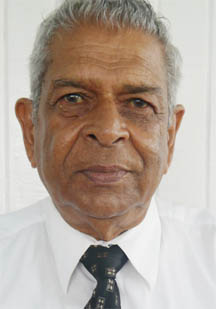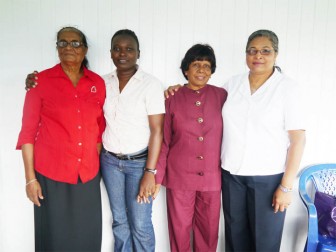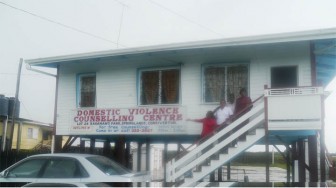A Berbice couple walked into the Domestic Violence Counselling Centre a week ago last Thursday looking rather pensive; they were glad for the opportunity to talk about their problems. When the counsellor told them to “have a seat” they did so far apart, but by the time the session was over they came out smiling with their arms around each other.
The centre, located at Rahaman’s Park, Springlands, Corriverton was opened in April and already more than 100 persons have visited to seek help. It is manned by four counsellors along with a secretary, Nagma
Kanaya.

The couple was happy that they had visited to take steps to resolve their differences in a peaceful manner. Their issue had ended up before the court and Magistrate Krishndat Persaud referred them for counselling. Persons believe that when certain issues are taken to court it results in couples drifting apart rather than them reconciling.
Although it was a rainy day when Stabroek News visited, quite a few other persons showed up seeking help for domestic problems. The previous day the centre had been filled with a lot more persons, the counsellors said.
Social issues have always been a major issue in the area and many of the matters have ended up before Magistrate Persaud. He would refer them for counselling but then there was no place available nearby for them to turn to, and that motivated him to take steps to change that.
So with a building belonging to him on extensive land overlooking the Atlantic, he thought that it would be perfect to convert it into a counselling centre. Persaud who was very modest about the establishment of the centre preferred the counsellors to speak to this newspaper.
Senior counsellor, Helene Baijnauth related that “after sitting on the bench for so long he [the Magistrate] saw the need for a place like this.“ It has always been his dream to help abused persons, she said. He renovated the building and furnished it to make it comfortable for counselling. And being the patron, he pays the bills and provides all of the stationery.
Baijnauth, along with another counsellor, Michelle Austin, were trained by the United States Agency for International Development (USAID). There are also two other counselors: Canadian-based Khrishna Dukhan
and Chandardat Totaram. Dukhan received her training in Canada while Totaram served as the secretary then the president of a peace committee on the Corentyne.
Baijnauth said the intensive 80-hour training by UNICEF involved techniques on dealing with domestic violence. She also has experience in teaching mentally challenged children in England, and when she moved to Canada she began teaching first offenders at the St John’s Training School.
Along with the counsellors and a secretary, the centre also has the services of volunteers from Legal Aid and from Dr Arti Sharma. Someone has also offered to provide floral arrangement and hairdressing training to the female clients so that they can be self-reliant.
The counsellors have also received requests from the principal of the Corriverton Technical Institute to go there to speak to the students.
According to Baijnauth, the presence of the centre has helped to reduce the incidence of abuse in many families. She is glad that more persons are coming out to seek counseling, although it is still deemed a “taboo thing.”

The counsellors “work late into the evenings to resolve cases and to put people’s minds at ease. Some sessions last for two hours.” Baijnauth said persons including children with “mild depression would come in just to talk, and go out smiling.” She said too that the “staff is cohesive, we have a good relationship and we work together for the betterment of society. We hope that with [the support of] Mr Persaud and Dr Sharma we can put laughter back into the lives of persons.”
She told Stabroek News that they are “willing to work with any institution” and that they do not discriminate against anyone. In cases of domestic abuse, she explained, they are happy that “the husbands come too because they get a chance to put their stories out there.”
She said, “We would take turns listening to the couple and then bring them together to talk. We allow them to speak their minds… and after that they would get to laugh again.” She has found that some of the problems are not so serious, “but they [the couples] have a story to tell from yesteryear that they had boiling and boiling…” and they did not want to let them go.
The counsellors are also in contact with a senior official from the Ministry of Education who would take steps in cases of problems with delinquent students.
Homework
Austin told this newspaper that it was sad to learn that so many homes have been broken and so many lives have been changed because of violence. As counsellors “we try our best to help them; we try not to give
advice but we help to steer them down the right path.”
She continued, “For instance I have a client; she is 13-years-old. Her parents had asked her to leave the home. But the girl came with all the answers and I told her that she already knows what it was that she wanted in life.”
Austin who is married with two children always likes to give her clients “homework” such as getting abusive husbands to “stop doing it [abusing] for a week. They have to return in a week for follow-up.” She noted that “if they can do it for a week they can do it for the next week and then for a month and eventually they would stop.”
She also got another client who was accustomed to smoking three packs of cigarettes per day to reduce to half that amount and eventually to less than one pack. According to her, his challenge was easy because “he works in the backdam so he can’t run to the shop but he takes sweets and that has helped him to break down the bad habit.

Austin who prefers to counsel families instead of just a child said alcohol and having extra-marital affairs are the main contributory factors to domestic problems.
She loves working with the people because “I enjoy making a difference in their lives and would continue to do so.”
The other counsellor, Dukhan, felt that “the community needed a centre like this because it has a lot of violence which is more prominent among younger families.” She observed that “some problems had been going on for years and nothing was done to change things. Many husbands and wives have separated due to financial situations and physical and alcohol abuse.”
She said there are very sensitive cases too where rape or the neglect of children was involved, and she is glad that the centre is helping. Dukhan gave examples of cases where “two brothers were involved and had done the exact thing to their wives like having extra-marital affairs, drinking and abusing them.” Elaborating, she said that “financially they [families] were struggling and each husband walked out and left four children behind. They had no lights and water. Their problems were wide and they suffered silently.”




